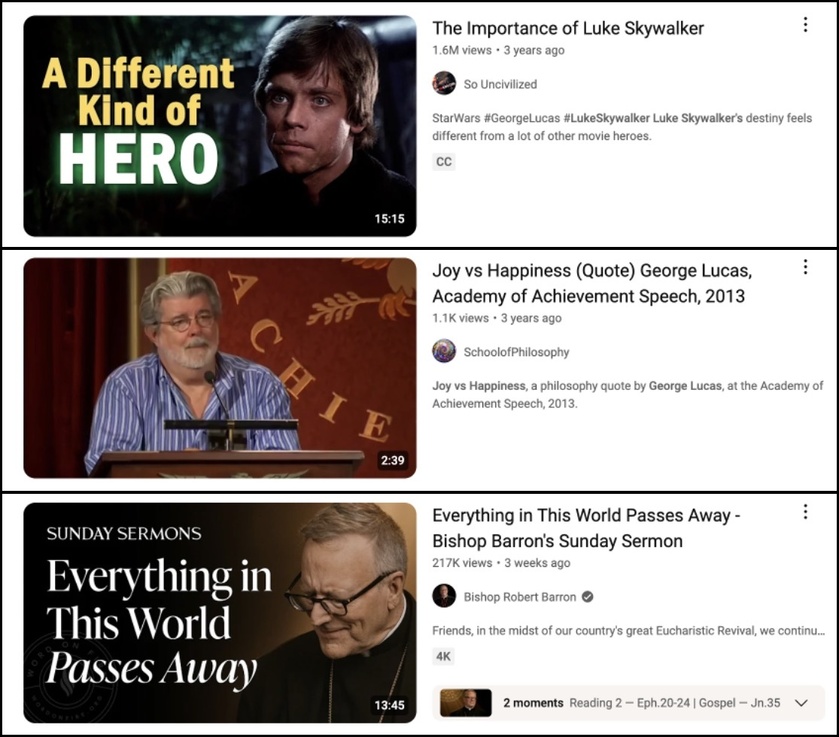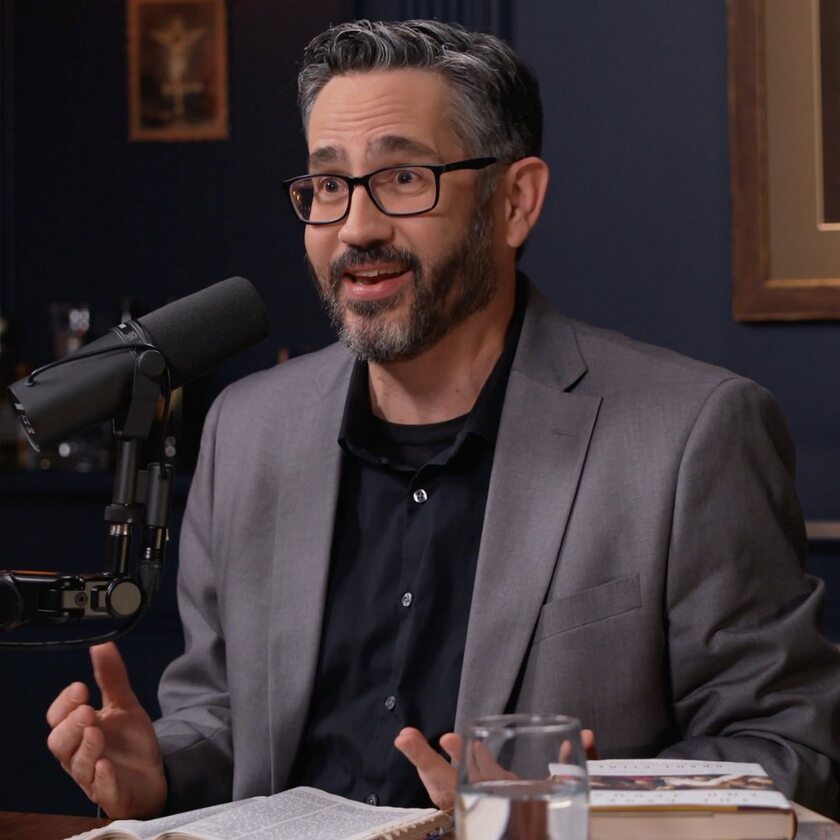Pop-Cultured Catholic #7: George Lucas’ Surprisingly Christian Distinction Between Happiness (As Pleasure) and Joy
A few years ago, I happened to come across a beautifully written Star Wars video essay, which has been titled “The Importance of Luke Skywalker” and uploaded on the YouTube channel So Uncivilized. This 15-minute analysis gives great insight into why the character of Luke Skywalker has connected with many moviegoers and what makes his hero’s journey over the course of the Original Trilogy unique. That is, despite Luke seemingly starting out the same way as so many other protagonists in mythology and fantasy, who fit the basic hero archetype.
I am sharing the video essay's link here, and my analysis will mainly focus on one specific part of it: https://www.youtube.com/watch?v=NvlWSsZwLn0
To end his essay on a high note, the YouTuber blends in some abridged clips of George Lucas talking about the proper meaning of joy, which sounds surprisingly Christian, given his complex experiences and attitudes towards different world religions. Here is a transcript of his abridged version (the full clip will also be provided through an additional link below).
"I've discovered along the way that happiness, you live in two worlds here: 'happiness is pleasure' and 'happiness is joy'... Pleasure is short-lived, lasts an hour, lasts a minute, lasts a month, and it peaks and then goes down. It peaks very high. But the next time you want to get that same peak, you have to do it twice as much. You know, it's like drugs... On the other hand is joy. And joy is the thing that doesn't go as high as pleasure... but it stays with you. Joy is something you can recall... the secret is that, even though it's not as intense as the pleasure, the joy will last you a lot longer... people who get the pleasure, they keep saying 'Well, if I can just get richer and get more cars...'. You'll never relive the moment you got your first car. That's it. That's the highest peak... If you're trying to sustain that level of peak pleasure, you're doomed... Just accept the fact that it's here and it's gone, and maybe again it'll come back... Pleasure (sought only for itself) is purely self-centered. It's all about your pleasure... It's a selfish, self-centered emotion that's created by a self-centered motive of greed. Joy is compassion. Joy is giving yourself to somebody else or something else. And it's a kind of thing that is, in its subtlety and lowness, much more powerful than pleasure. You get hung up on pleasure, you're doomed. If you pursue joy, you'll find everlasting happiness. So with that, I'm gone. Bye bye."
When I first heard that summation by George Lucas, it reminded me so much of the wisdom I have heard from my Catholic influences. One slight difference in the use of terminology is that George is using "happiness" as an umbrella term for both "pleasure" and "joy", whereas many of the Catholic speakers I listened to tend to more exclusively mean "pleasure" (and/or positive emotional states) when they say "happiness". Nonetheless, the underlying meaning is still echoed.
One recent example I have come across was Bishop Robert Barron's sermon for August 4, 2024 titled "Everything in This World Passes Away". As he said before, Bishop Barron likens the world's created goods which bring pleasure to a great fireworks show that comes and goes, in the grand scheme of eternity. They are beautiful and ought to be appreciated, but they do not last forever nor can single-handedly provide the ultimate fulfillment. Barron also quotes the Gospels, where Jesus says "Do not work for food that perishes, but for the food that endures for eternal life". When a person has the grace to give oneself faithfully to God and compassionately to the world on the former's behalf, they will have gained a greater sense of joy. And sometimes that sense of joy is strong enough for one to be at peace, even in the midst of heavy crosses, suffering, and martyrdom, where any sense of pleasure or superficial happiness is nowhere to be seen. If one chooses to remain in that state of grace and faithfully devoted to God and neighbor, then he already becomes similar to a soul in Purgatory, who may still be suffering some trials but can joyfully rest in the promise of salvation and the knowledge that his ultimate purpose for existing is being fulfilled.
While George Lucas has had a complex set of attitudes and experiences towards different religions, from Methodist Christianity to Buddhism, the ability of his Star Wars stories to resonate with me uniquely as a Catholic may lie in J.R.R. Tolkien's distinction between "allegory" and "applicability". Tolkien has stated that he typically avoids writing his works with the intention of it being a strict one-to-one allegory. Instead, "I much prefer history – true or feigned– with its varied applicability to the thought and experience of readers. I think that many confuse applicability with allegory, but the one resides in the freedom of the reader, and the other in the purposed domination of the author". When the emphasis is more on allegory, there are much greater constraints for a story's characters and plot elements to neatly correspond with an identical pattern of another set of characters/situations/laws. Also, allegory is more dependent on the author's specific intent. Meanwhile, a story that strives more for general applicability allows each character or plot element to convey thoughts/ideas, about many different things at different times, plus give the reader more freedom to bring their perspective into it.
When viewed through the lens of applicability, Star Wars can uniquely resonate with me as a Catholic Christian, even if George Lucas' intent was more to pay homage to a wide array of different Western/Eastern religions, pop-cultural genres, historical events, and timeless universally recognizable truths, which could all speak of God to some extent whether directly or indirectly. My mother liked to point out how, if the Force in Star Wars were to be interpreted solely as a direct allegory for God, then one could easily run into some implications which fit a more New Age spirituality than a traditional Christian theology. However, if you read Star Wars as a story that is meant to be applicable to different things at different times, then the Force works as something which can occasionally remind us of our Christian faith in God, while also serving different purposes in the story at other times. Also, when the Star Wars movies and shows have parts like the following, we get many things which can resonate from a Christian perspective: Luke Skywalker having to trust in the Force's power/guidance; Emperor Palpatine emulating the Devil archetype; the Republic falling into corruption to become the Empire; the Republic and Jedi Order's use of dehumanized cloned soldiers as a means to an end which backfires; Anakin Skywalker's fall from grace into Darth Vader; various heroic self-sacrifices; and Luke's mercy which keeps him from becoming like Vader and leads to the latter's redemption. It has often been said to me that many of the great timeless works of art have captivated audiences, arguably because they speak of God and his ways, whether their authors consciously intended it or not. In the video essay I cited, the YouTuber also plays a clip of George Lucas stating this quote: "Because the core issues that I am dealing with are... if they were valid two thousand years ago, they've got to still be valid today, even though they're not in fashion. And I think we've gone for a few generations where a lot of those sort of more basic stories have fallen by the wayside".
While Peter Jackson's adaptation of J.R.R. Tolkien's The Lord of the Rings has recently taken the Star Wars Original Trilogy's place as my favorite series of movies, the latter is still one of my favorites to this day. I used to rank Star Wars' OT as my favorite movie series of all time, while Peter Jackson's LotR Trilogy was my close second favorite. However, as I noticed the even greater array of intended Catholic applicability in Tolkien's work, I started to lean towards LotR more. Also, the definitive way(s) to experience Peter Jackson's LotR Trilogy is easy to understand and readily accessible, whereas the definitive way to experience the Star Wars Original Trilogy has been muddled by constant changes being made to each edition (some good, some bad, and some yielding mixed reactions) plus a lack of ways to easily access the theatrical cuts of those films. Despite this, I appreciate the impact that Star Wars' themes and morals had on my coming of age. Even the Prequel Trilogy, for all its flaws, had elements which deeply struck a chord with me a young Catholic. I would also liken it to Nickelodeon's "Avatar: The Last Airbender", regarding how applicable I found some of its messages and themes to my faith, even with how a lot of the franchise's raw world-building more directly references elements of Eastern religions.
God bless you all, may the Force be with you, and feel free to check out the two additional links:
“The Importance of Luke Skywalker”
https://m.youtube.com/watch?v=NvlWSsZwLn0
"Joy vs Happiness (Quote) George Lucas, Academy of Achievement Speech, 2013"
https://www.youtube.com/watch?v=PFG25GLsrpU
"Everything in This World Passes Away - Bishop Barron's Sunday Sermon"
https://www.youtube.com/watch?v=HuDxtC0u4CM
























